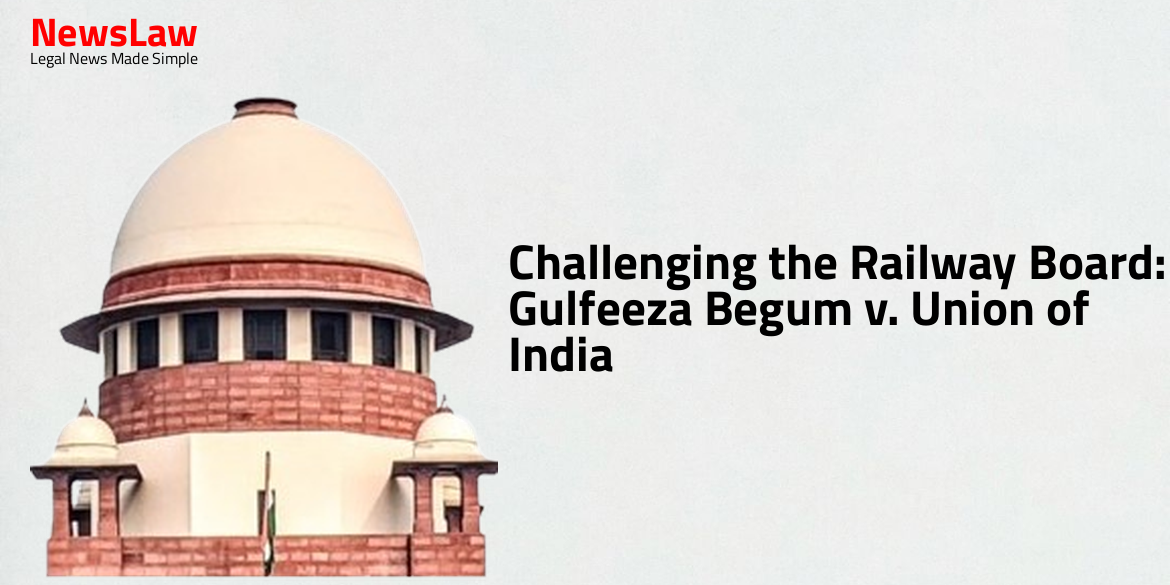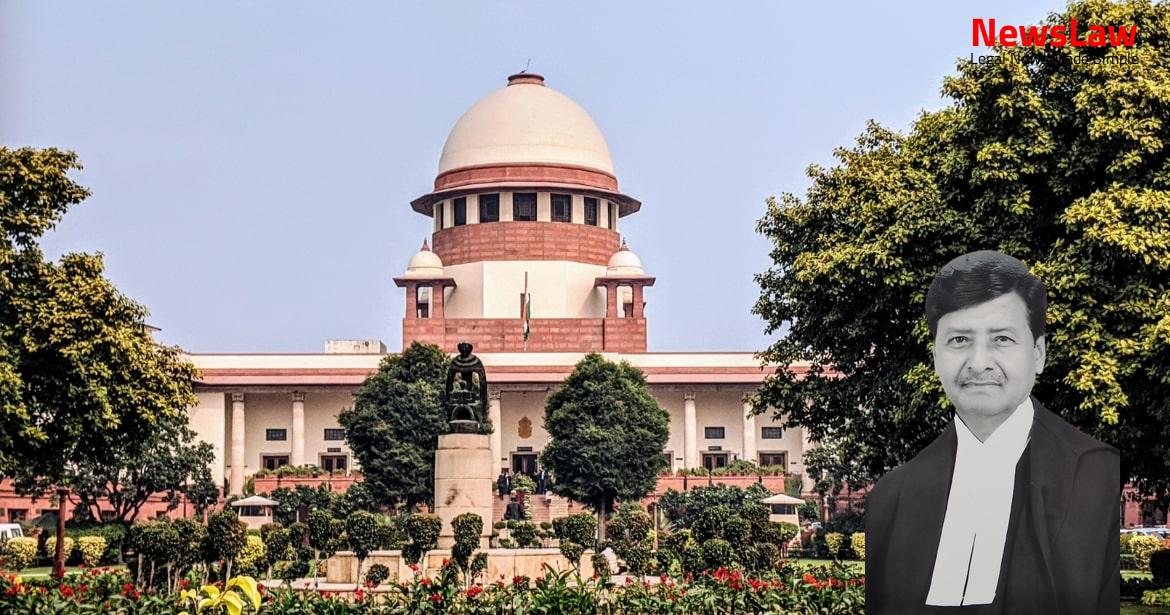Exploring the detailed legal examination of an arbitration clause in a recent case sheds light on the essential elements required for its validity. The court’s analysis of the clause’s compliance with legal standards provides valuable insights into navigating contract disputes. Let’s uncover the nuances of arbitration law and the significance of meeting the court’s requirements in resolving conflicts.
Facts
- The Appellant owns and possesses land for development in Village Deolai, Maharashtra.
- The Development Agreement and GPA were executed between the Appellant and Respondent No. 1 for constructing ‘Amay Apartments’.
- Disputes arose when Respondent No. 1 agreed to hand over only 45% of the developed area to the Appellant.
- An arbitration clause, under Clause 18 of the Development Agreement, was contested by Respondent No. 1 for lacking explicit wording for arbitration.
- The absence of key arbitration terms, as pointed out by Respondent No. 1, led to legal contentions regarding the enforceability of the arbitration clause.
- The Appellant sought an injunction under Section 9 of the Arbitration and Conciliation Act, 1996, in M.A. R.J.I No. 285 of 2016.
- Despite serving legal notices and initiating arbitration proceedings, disputes between the parties remained unresolved.
- The Appellant terminated the Development Agreement and GPA and notified the public via a newspaper publication.
- The High Court acknowledged the existence of Clause 18 in the Agreement.
- Clause 18 provides for disputes to be referred to arbitration.
- The High Court accepted the contentions of Respondents.
- Clause 18 lacks certain essential ingredients of a valid arbitration agreement.
- Clause 18 does not mandate that the decision of the arbitrator will be final and binding on the parties.
- Consequently, the High Court dismissed the application as not maintainable.
Also Read: Judicial Promotion Dispute Resolved
Issue
- The specific issue at hand is determining the validity of Clause 18 as an arbitration clause under Section 11 of the Act.
- The main contention revolves around whether Clause 18 of the Development Agreement dated 29.05.2014 meets the requirements of a legally binding arbitration agreement.
- The crux of the matter is whether Clause 18 possesses all the necessary elements to be considered a valid arbitration clause.
Also Read: Ex post facto Environmental Clearance in Bio-Medical Waste Case
Arguments
- Learned counsel for the Appellant argued that Clause 18 indicates the parties’ intention to refer disputes to arbitration.
- The Appellant emphasized the importance of the parties agreeing that the decision of the private tribunal would be binding on them.
Also Read: Land Dispute Legal Analysis
Analysis
- Section 7 of the Act does not mandate any particular form for the arbitration clause.
- Case law settled that the form of the arbitration clause is not mandated by the Act.
- The case of Rukmanibai Gupta v. Collector, Jabalpur was cited to support the proposition.
- The governing law chosen by parties was the Arbitration and Conciliation Act, 1996 or any re-enactment thereof.
- An arbitration agreement exists when disputes are referred to arbitration in the clause.
- Different arbitration clauses in various cases were analyzed to determine validity.
- Attributes of an arbitration agreement were outlined, including present or future differences, intention to settle by a private tribunal, written agreement to be bound, and ad idem of parties.
- The nature of arbitration clauses in specific cases like Jagdish Chander and Encon Builders were discussed.
- Essential elements of an arbitration agreement were detailed by the Court.
- Validity of arbitration clauses depends on the intention of parties to resolve disputes through arbitration.
- Reference to UNCITRAL Model Law on International Commercial Arbitration emphasizing minimal court intervention.
- Courts should give weight to the substance of arbitration clauses reflecting parties’ intent.
- Parties must abide by the terms of the contract, including arbitration clauses they agreed upon.
- Courts must uphold the validity of arbitration agreements if the substance reflects the parties’ intent.
- The High Court should have given full effect to the arbitration clause in the case at hand.
- The Civil Appeal was allowed based on the discussion and analysis provided.
- The High Court made an error by ruling that the Appellant’s application under section 11 was not maintainable due to a lack of a valid arbitration clause.
- The High Court failed to consider the clear intention of the parties as evident from Clause 18 of the contract, which pointed towards arbitration.
- The clause appointing the Managing Director as the adjudicator-cum-arbitrator was deemed invalid due to potential bias, highlighting the principle that one cannot judge their own cause.
- The principle of party autonomy in arbitration is emphasized and deserves protection in this case.
- The absence of explicit words like ‘final and binding’ does not negate the intention of the parties to arbitrate their disputes, as indicated by other parts of the agreement.
- Even if the clause lacks certain essential characteristics of arbitration, the parties’ clear intention to refer disputes to arbitration and abide by the tribunal’s decision is evident.
- The clause in question clearly states that all disputes between the parties must be referred to arbitration of a Sole Arbitrator, or a tribunal of three arbitrators if no agreement is reached.
- The agreement does not provide any alternative for dispute resolution other than arbitration.
- The governing law for the arbitration has been agreed upon by the parties as the Arbitration and Conciliation Act, 1996.
- The agreement does not exclude any attributes of an arbitration agreement as required by previous court decisions.
- It is emphasized that an arbitration clause does not have to be in any specific form according to previous Court rulings.
- The High Court was deemed unjustified in its ruling that Clause 18 did not meet the essential criteria of a valid arbitration clause.
- Clause 18 of the Development Agreement is considered a valid arbitration clause.
- The court has upheld the validity of the arbitration clause mentioned in Clause 18.
- This means that any disputes or issues arising from the Development Agreement must be resolved through arbitration as per Clause 18.
Decision
- Appellant has invoked the arbitration clause.
- Mr. Justice P.V. Hardas, former Judge of the Bombay High Court, appointed as Sole Arbitrator.
- Issues on merits to be determined by the Arbitrator in accordance with law.
- Arbitrator entitled to a fee as per the Fourth Schedule of the Act.
- Impugned judgment and order dated 07.07.2021 by Bombay High Court at Aurangabad set aside.
Case Title: BABANRAO RAJARAM PUND Vs. M/S SAMARTH BUILDERS AND DEVELOPERS (2022 INSC 935)
Case Number: C.A. No.-006272-006272 / 2022



